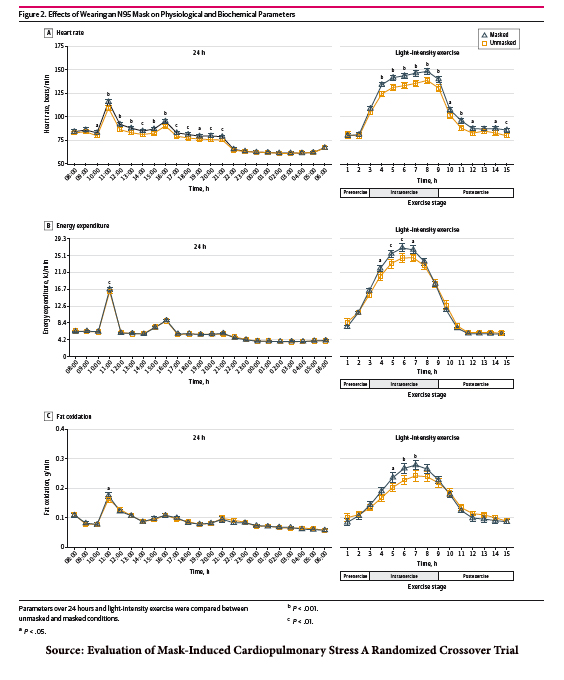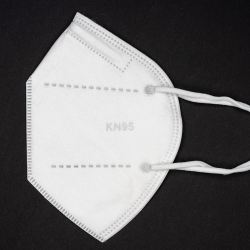Masks were once confined to those celebrating Halloween or as historical notes about historic plagues. But they returned to command our awareness in the Age of COVID. There are differences of opinion on how efficacious they are: the overall benefit versus how much damage they might have done. A new study speaks to their physiologic harms.
I’ve written before on the physiology of wearing masks in order to debunk some misinformation on the impact of masks on childbirth. A new research letter in JAMA Network Open considers the impact of wearing an N95 mask except while asleep. The study involves 30 healthy adults wearing an N95 while awake and living in a metabolic chamber where the atmosphere and caloric intake could be controlled. Twice a day, for thirty minutes, the participants “exercised” using an arm ergometer at a “light” intensity, 40% of their maximal effort. [1]
Compared to not wearing a mask at all,
- Wearing the N95 mask slowed respirations, decreased oxygen saturation, and increased heart rates by about 4 beats/minute.
 Exercising while wearing the N95 mask increased heart rate by an additional 8 beats/minute and raised systolic blood pressure by about 6 mm Hg and diastolic by 5mm Hg.
Exercising while wearing the N95 mask increased heart rate by an additional 8 beats/minute and raised systolic blood pressure by about 6 mm Hg and diastolic by 5mm Hg.- These physiologic changes resulted in slightly increased fat oxidation and energy expenditure.
- There were also increases in metanephrine and normetanephrine levels - hormones that impart the fight or flight response.
There is, therefore, no doubt that wearing an N95 mask brings about physiologic changes. The graph makes clear how small these physiologic changes are. The lines of the masked and unmasked are nearly superimposed upon one another, and the exercise period demonstrates a physiologic change that quickly resolves. Moreover, those slight changes in our physiologic parameters disappeared within an hour or so of taking the N95s off to sleep.
“Although healthy individuals can compensate for this cardiopulmonary overload, other populations, such as elderly individuals, children, and those with cardiopulmonary diseases, may experience compromised compensation.”
Those individuals with compromised compensation are, in many instances, the ones that most need protection from infection and would benefit from wearing an N95 mask. For the rest of us, the great majority of us, N95 masks do not present any significant health harm. They will cause temporary changes to your physiologic parameters, but that is the sign of a resilient physiologic response – compensatory physiologic responses are never complete. As with other studies of the physiologic effect of masks, the most apparent and vocalized harm was that they were uncomfortable to wear.
The bottom line is that masks alter our physiologic responses as we should anticipate; and our bodies automatically compensate - that is what homeostasis is about. For individuals with already compromised physiology, the elderly as a generalization, and those with pulmonary disease, more specifically, the protection from infection afforded by masks can be weighed against their discomfort, and perhaps some transient worsening of some physiologic parameters.
[1] An arm ergometer is an “arm bike,” exercise equipment designed specifically for upper body workouts; instead of pedaling, you move your arms. The resistance can be increased or decreased to maintain a steady rate of exertion.
Source: Evaluation of Mask-Induced Cardiopulmonary Stress A Randomized Crossover Trial JAMA Network Open DOI: 10.1001/jamanetworkopen.2023.17023

